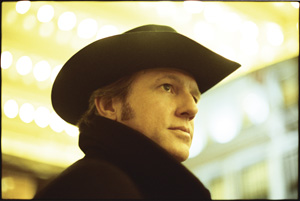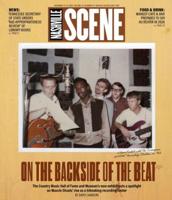Chuck Mead makes a virtue out of relaxation on his new full-length Journeyman's Wager, but the narratives have a knockabout air, and the former BR549 leader sounds like he's learned to roll with a few punches. It's the kind of easygoing record that reveals itself gradually. Mead writes like a man with a sense of musical and social history, which means the jokes don't smother the serious parts and the allusions to 1970s country and pub-rock make their points in present time. Mead might be relaxed, but Journeyman's Wager moves along smartly enough for pop music.
Mead moved to Nashville from Lawrence, Kan., in 1993, and hit town itching to play country music. "I came here quite a few times in the '80s, and got to be friends with Webb Wilder and all of those guys," Mead says. "Back then you could go to The Ryman for a dollar-fifty, just walk through, and no one would bother you, communing with all the ghosts. It was really spooky back then."
Growing up in Kansas in the '60s, Mead absorbed country along with British Invasion pop. Like Nick Lowe or Commander Cody and His Lost Planet Airmen, Mead got hooked on deep Americana, but he also respected studio-craft and the art of the three-minute song, with a sharp 10-second guitar solo thrown in for good measure. "You put a lot of guys in the studio who don't really know what they're doing, and they're trying to play Western swing and it comes out rock 'n' roll," he says.
On Journeyman's Wager, Mead and his first-rate sidemen certainly sound as if they know what they're doing. Ray Kennedy's production adds electric piano, organ and saxophone to a series of crisp rhythm tracks, but Wager is a classic guitar record. Audley Freed and Kenny Vaughan knock off a few concise, stylish solos, and nearly every song is anchored by a catchy riff—like the descending figure that kicks off "She Got the Ring (I Got the Finger)."
"We wanted to do something that was organic and really represented where my head was at," Mead says. "Ray [Kennedy] really understands all that. We didn't want to piece it together. We tried to get it right and go back and overdub and all that, but we did it all on 2-inch tape. There's no Auto-Tuning, and you can tell that, too."
The result is a record that makes good use of Mead's slightly dry voice and exploits his flair for storytelling. "Out on the Natchez Trail" is a superb picaresque that recalls Dave Edmunds around the time of Repeat When Necessary. "I saw the boy king / I saw Chickasaw Sam / Then it all went black / With a wave of his hand," Mead sings.
Mead says his songwriting has evolved since his days with BR549. "We were kind of self-contained and didn't do the Nashville co-write, where you sit around in a room Brill Building-style. But when I got my writing deal and started really trying to write with other people, that's how you learn—writing with somebody like Guy Clark. It's important to get with a guy like that."
None of Mead's collaborations with Clark appear on Wager, but Mead worked with several writers for the project. Nashville tunesmith and producer Jon Tiven co-wrote three of the collection's songs, including "She Got the Ring" and "After the Last Witness Is Gone," a lighthearted song about human extinction. With its subtle chord changes, "After the Last Witness" stands as one of Wager's finest moments.
"We come from very different places geographically as well as musically, but we love a lot of the same records," Tiven says of their collaboration. On the evidence of Wager, those records include semi-classics on the order of Brinsley Schwarz's definitive pub-rock album Nervous on the Road, Commander Cody's Hot Licks, Cold Steel & Truckers Favorites and Artful Dodger's 1975 power-pop single "Wayside," whose chords make an appearance in Mead and Mark Collie's "A Long Time Ago."
For all its formal acuity, Wager offers narrative in the grand tradition, and real rock 'n' roll absurdity along with the historical perspective. "Caesar ruled the Western world / From the golden streets of Rome / You could hear him screaming / 'Get Brutus on the telephone,' " Mead sings in "I Wish It Was Friday." He delivers the lines with admirable conviction, which means this journeyman is a cultured man after all.
Email music@nashvillescene.com





